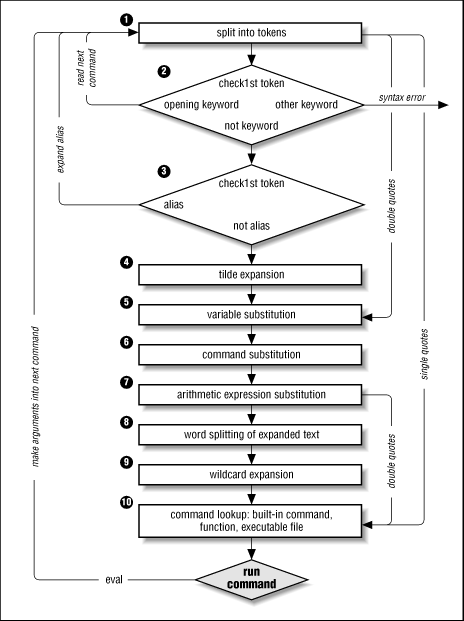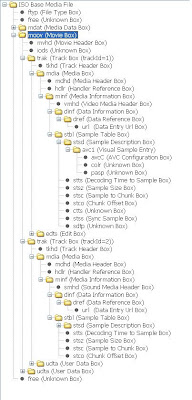Linux - Back To Basic Part 1 - Shell Command-line Processing, Quoting and Example
Command-line Processing
Be it bash or ksh, when you enter a command to command-line, they will process your input before running the command
Below is the flowchart for ksh command-line processing. See http://docstore.mik.ua/orelly/unix2.1/ksh/ch07_03.htm for more details

Quoting
It is always good to " " or ' ' your command parameter. Without quoting, it may result in unexpected result.
Quoting tells the shell to bypass certain steps in the above flowchart when the shell is performing command-line processing. Usually, we may want to ignore pipe characters, aliases, tilde substitution and wildcard expansion for the command parameters
See section 7.3 from the given link on Command-line Processing for more details
Example
Command-line processing and quoting effect can easily be seen in GREP.
Grep expect the following syntax
grep PATTERN file
where it expects PATTERN as follows
Now, we have 3 general scenario in resolving the following command
ls /your/current/dir | grep filename_*
when filename_* is used as PATTERN without any quotes during command-line processing
1. No file with "filename_" in /your/current/dir
The command will be resolved to
ls /your/current/dir | grep filename_*
during command-line processing and it should return no result. The result is correct.
2. There is a single file call "filename_a" in /your/current/dir
The command will be resolved to
ls /your/current/dir | grep filename_a
during command-line processing and it should return a single result with filename_a. The result is correct.
3. There are N files named, ie "filename_a, filename_b, filename_c" in /your/current/dir
The command will be resolved to
ls /your/current/dir | grep filename_a filename_b filename_c
during command-line processing and it return no result. This is WRONG because we expect grep to return N files with prefix filename_
If you compare scenario 2 and 3, both scenario 2 and 3 use the same command
ls /your/current/dir | grep filename_*
However, scenario 3 produced wrong result. Such unexpected error is due to wildcard expansion of command-line processing by the shell and grep uses filename_a as PATTERN and search on filename_b and filename_c as input files.
Thus, in order for the command to work correctly, your command should be
ls /your/current/dir | grep "filename_*"
This command will be resolved to
ls /your/current/dir | grep "filename_*"
during command-line processing in all 3 scenario and return correct result respectively.
Be it bash or ksh, when you enter a command to command-line, they will process your input before running the command
Below is the flowchart for ksh command-line processing. See http://docstore.mik.ua/orelly/unix2.1/ksh/ch07_03.htm for more details

Quoting
It is always good to " " or ' ' your command parameter. Without quoting, it may result in unexpected result.
Quoting tells the shell to bypass certain steps in the above flowchart when the shell is performing command-line processing. Usually, we may want to ignore pipe characters, aliases, tilde substitution and wildcard expansion for the command parameters
See section 7.3 from the given link on Command-line Processing for more details
Example
Command-line processing and quoting effect can easily be seen in GREP.
Grep expect the following syntax
grep PATTERN file
where it expects PATTERN as follows
- No space if quote are not used
- If space are required in PATTERN, you need to quote your PATTERN string
Now, we have 3 general scenario in resolving the following command
ls /your/current/dir | grep filename_*
when filename_* is used as PATTERN without any quotes during command-line processing
1. No file with "filename_" in /your/current/dir
The command will be resolved to
ls /your/current/dir | grep filename_*
during command-line processing and it should return no result. The result is correct.
2. There is a single file call "filename_a" in /your/current/dir
The command will be resolved to
ls /your/current/dir | grep filename_a
during command-line processing and it should return a single result with filename_a. The result is correct.
3. There are N files named, ie "filename_a, filename_b, filename_c" in /your/current/dir
The command will be resolved to
ls /your/current/dir | grep filename_a filename_b filename_c
during command-line processing and it return no result. This is WRONG because we expect grep to return N files with prefix filename_
If you compare scenario 2 and 3, both scenario 2 and 3 use the same command
ls /your/current/dir | grep filename_*
However, scenario 3 produced wrong result. Such unexpected error is due to wildcard expansion of command-line processing by the shell and grep uses filename_a as PATTERN and search on filename_b and filename_c as input files.
Thus, in order for the command to work correctly, your command should be
ls /your/current/dir | grep "filename_*"
This command will be resolved to
ls /your/current/dir | grep "filename_*"
during command-line processing in all 3 scenario and return correct result respectively.



Comments
Post a Comment